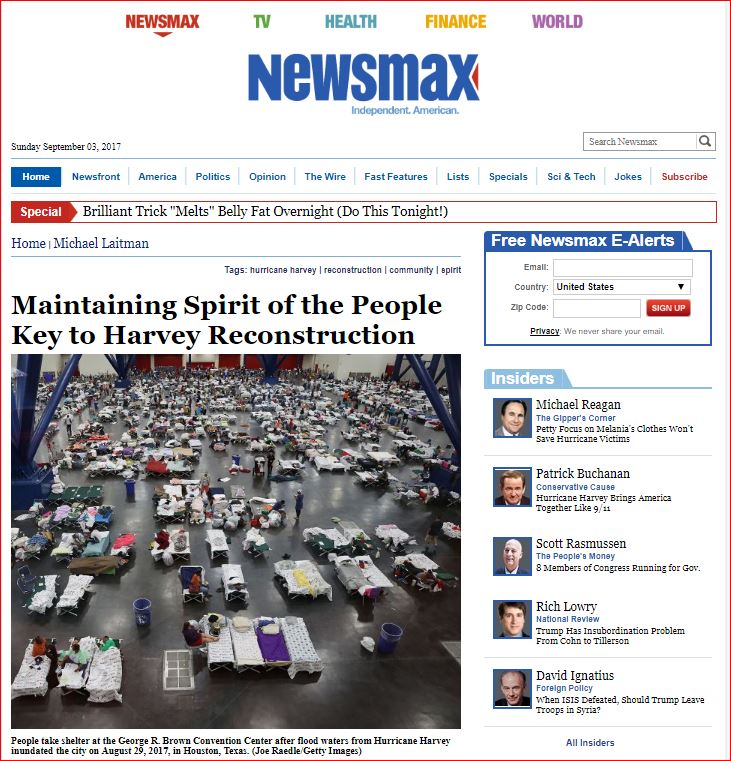 Even though I spent last weekend in Germany at a convention with my European students, I followed closely the unfolding catastrophe in Houston. The reports in the media and the stories I heard from my students out there were heartbreaking. This event is undoubtedly a trauma that will stay with people for years to come.
Even though I spent last weekend in Germany at a convention with my European students, I followed closely the unfolding catastrophe in Houston. The reports in the media and the stories I heard from my students out there were heartbreaking. This event is undoubtedly a trauma that will stay with people for years to come.
At the same time, I think that as a society, the worst thing that Texans can do for themselves is to assume a passive, victim attitude. The reconstruction should begin as soon as possible, and the first thing to reinforce is the people’s spirits.
Money can be recouped, property can be rebuilt, but no one can mend a broken spirit except for the people whose spirits were broken. I saw the reports of Houstonians rescuing each other from flooded homes, and this is exactly the right spirit. However, it is one thing to feel empathy for your neighbor during a crisis, and an entirely different thing to feel it on a day-to-day basis, yet this is what people really need.
Today’s American society is so fractured that even the worst flooding in U.S. history did not quench the divisiveness altogether. Kenneth Storey, for example, a substitute Tampa University professor, was fired after tweeting “hopefully this will help them [Texans] realize the GOP doesnt [sic] care about them,” adding that he is “only blaming those who support the GOP.” But I don’t believe that even one of the first responders, Cajun Navy volunteers, and countless other good Samaritans who plucked people out of flooded homes and submerged cars asked the stranded, desperate people for whom they voted before helping them to safety.
And yet, unless residents and authorities alike make a conscious effort to maintain this solidarity, it will vanish as soon as the water dries. Regrettably, it is not genuine unity, but instinctive empathy that emerges during crises. Had it been real, it would have been there prior to the storm, as well.
Glenn Thrush of The New York Times pointed out that Harvey offers President Trump “an opportunity to recapture some of the unifying power of his office.” It would be wonderful if Trump could focus on unity and solidarity, but I don’t think Houston residents should wait for anyone. Shelters are normally stressful places. Thousands of strangers huddling together for weeks with no privacy and with less than minimal facilities for maintaining civil life is hardly a recipe for happiness.
Yet, if used correctly, these conditions can form bonds that would not form under normal circumstances. If I were there, I would invite people to sit together in a circle, because a circle makes everyone equally important, and over coffee, I would suggest that we all share our most optimistic vision for a life after Harvey. Afterward, I would ask, “What would it take to accomplish these visions?” I have no doubt that with some mutual responsibility and care, most people’s visions are achievable. But without solidarity, these visions will be wishful thinking.
Our daily routines and everyday hardships make us forget a very important fact: We are all dependent on each other. Other people manufacture the food we eat, and other people employ us or we employ them so we can all support ourselves and our families. Our self-esteem depends on other people’s appreciation of us, and our mood depends to a great extent on the mood of the people around us. What we know is what we are told or shown, and what we think is intimately connected to what others around us think. In short, we are interdependent physically, economically, intellectually, and emotionally. Yet, how many of us feel that our connections with people around us are positive and constructive?
Apocalypses such as Harvey are game changers. They are opportunities to rethink everything and lift society to a completely new level of connection. The state of Texas can and should use the bane of the storm as a societal boon that will make Houston a role-model city in America.
My own students and friends are planning to go to the shelters as soon as conditions permit and engage with people to encourage them and help them connect with one another. If I could, I would go there myself and do the same. Since I cannot, I’m offering a free download of my book, “Completing the Circle,” containing connection games, ideas for conversations that help people connect, and lots more. If Texas lets this opportunity for change pass, it will make the next disaster even worse.
A couple of days ago, one of my students, whose family in Houston is still stranded, wrote me these positive words: “We are Texans! Texas can get thru [sic] anything; we just gotta keep on working hard & together.” Yes, togetherness is the key to all of our success now and always.
Featured on Newsmax.com